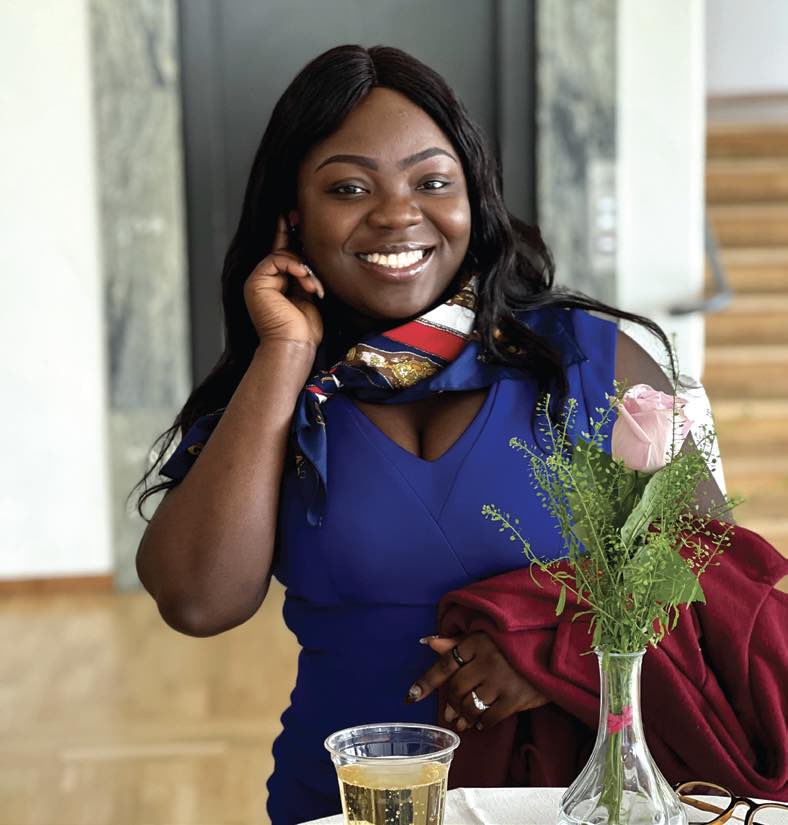Tribology as an emerging solution in multidisciplinary fields
By Oluwaseunnla Adelusi | TLT Scholarship Essay January 2023
There are limitless possibilities of solutions and advancement that materials research could deliver to society.
Jeanie S. McCoy Scholarship
The Jeanie S. McCoy Scholarship is awarded annually to recognize female college and high school students pursuing careers in tribology. This scholarship started in 2019, administered by the STLE Presidential Council, that was created to honor STLE Life Member Jeanie McCoy, who was a member of STLE for more than 66 years, joining in the early 1950s when the lubrication industry was clearly male dominated. McCoy passed away in July 2019.
The 2022 recipient is Oluwaseunnla Adelusi, a TRIBOS+ master’s graduate of Luleå University of Technology in Sweden. She is a recipient of the Erasmus Mundus Scholarship for a joint master’s degree, and she recently completed her thesis research on tribology applications in environmental remediation.
As a requirement for receiving the McCoy scholarship, students must submit an essay for publication in TLT discussing their goals, plans and interests in pursuing a future career in the field. For more information about the scholarship, visit www.stle.org.

Oluwaseunnla Adelusi
In 2019, Kenneth Holmberg and STLE Past President Ali Erdemir, top professors in tribology, completed research on global energy consumption, revealing that 23% of the world’s total energy consumption originates from tribological contacts. With such a heavy influence, I still find it weird that I only first heard about tribology in 2019. Today, three years later, I cannot imagine pursuing a program outside the field of tribology.
As an undergraduate student in Nigeria studying materials engineering, I learned about friction, wear and lubrication. However, the closest I came to tribology itself was a class module on corrosion engineering. Nevertheless, I was exposed to the limitless possibilities of solutions and advancement that materials research could deliver to society. Thus, after my undergraduate studies, I sought to apply for a master’s program, and this was where I first encountered the word tribology and the Joint European Master in Tribology of Surfaces and Interfaces Program (
www.master-tribos.eu). I was drawn to the novelty and the interdisciplinary nature of the field—how it could extend through mechanical engineering and materials science to even medicine and biology. So, when I got selected for multiple scholarships in 2020, I decided to accept the TRIBOS Scholarship, and that has been one of the best decisions I have made.
My tribology journey began at the University of Leeds, UK, before proceeding to the Laboratory for Tribology and Interface Nanotechnology (TINT) at the University of Ljubljana, Slovenia. At both institutions, I studied tribological contacts and surfaces, delving into the microscale world and discovering the significant impact of the smallest things imaginable. Coming from a materials engineering background with a basic understanding of concepts like nanotechnology, I had quite the “Voila!” experience relating it to atomic force microscopy (AFM). From lab experiments, I got to really see the atomic interactions and surface phenomena exhibited by matter at the nanoscale, which culminates into the many inventions conceivable in nanotechnology. Tribology truly explores the depths of materials science, yet it still manages to cover extensive areas like maintenance engineering and technical diagnostics, which is heavily influenced by friction and wear.
As I learned about various research possibilities, I was inclined toward areas— howbeit unconventional—where tribology could be applied to proffer sustainable solutions. Hence, for my master’s thesis, I opted for a project that applies tribology for environmental remediation. It entails manipulating and wielding the high energy created in tribology contacts for degrading toxic compounds. In this research, I am experimenting using customized tribotesters and various surface characterization tools at the Luleå University of Technology, which has world-class research competence in the field of tribology. As opposed to preventing friction like in lubrication systems, we utilize friction in a bottom-up tribological approach. The research approach is unconventional and, therefore, fascinating.
As I proceed in the TRIBOS program, I also experience diverse research of my peers working on projects with electric vehicles, ski gears, orthopedic materials, sustainable biobased lubricants and machine elements. Thus, I am constantly witnessing the multidisciplinary world of tribology, and I am optimistic that more students like me will share this experience. Being the first student from my alma mater to major in tribology, I have actively encouraged my colleagues, especially women, to follow this path. So far, three of my former schoolmates have been selected for TRIBOS, including the only lady in the 2021 class.
With the advancement in tribology research, I am passionate that the engineering industry will see more groundbreaking innovations, and I intend to contribute to this. I hope to continue my career in academia and research, collaborating with companies to explore sustainability-related technologies.
You can reach Oluwaseunnla Adelusi at seunnlaadelusi@gmail.com.